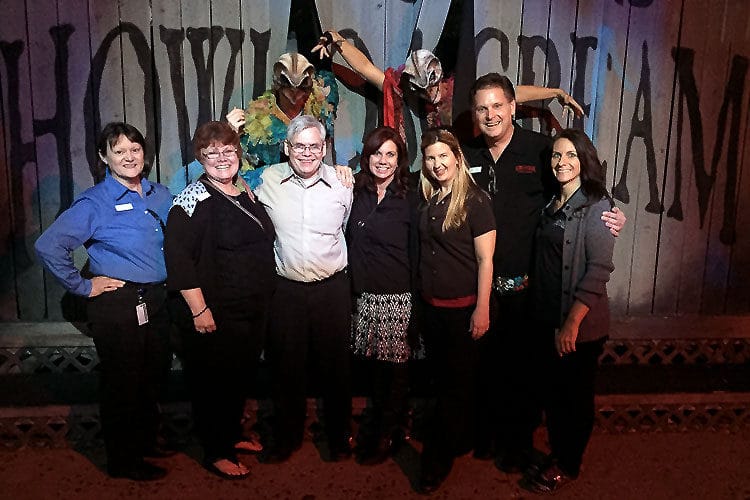By Angie Brown
It was sometime in the Fall of 2014 that I sat through auditions for a new show that was opening at the attraction where I’d worked for over 20 years. I sat at a long table and watched countless hopefuls doing what I’d call the “performer’s interview.”
Those auditions were fascinating for me. You see, I’m a human resources professional with zero—yes, nada, zilch, no—experience in the performing or entertainment world. My job that day was to watch and learn, and my role was to do what I do best: Evaluate the performers’ personalities and how they might fit into our culture.
To Become a Great Performer, Join a Great Team
In the book Grit, there’s an entire chapter devoted to A Culture of Grit. In the book, Angela Duckworth is interviewing Dan, a sociologist who’s spent over six years researching swimmers. In the interview, Dan says he still believes that talent and skill are critical to this idea of grit, but he adds one other important thing of note. Dan says, “The real way to become a great swimmer is to join a great team.”
So, this doesn’t seem logical to me. Referring to the many performers who auditioned that evening, they were already great. These weren’t new performers. They were seasoned. Some had held starring roles in other venues. As Duckworth points out, though, great teams don’t accept just anyone. There are tryouts, there are a limited number of spots, and there are standards. To her last point, the more elite the team, the fiercer the desire of those already on the team to keep those standards high.
We interviewed great performers, and then we hired. So, once you hire a seasonal performer, one who’s already great, how do you move them from being an individual performer to someone working on a team? How do you make them part of your culture?
We spent time talking about our culture during the interview process. As an organization, it’s vital to ensure that all of our employees engage from the start. We wanted the performers to know our standards and expectations for those filling the limited spots. Talking about your organization’s culture up front is essential. When you employ someone, you want them to be as engaged in your business as you are. You might say, “Well, they aren’t employees, they’re contractors.” My response to that is, “That’s merely how you pay them.”
Bring Seasonal Performers into Your Culture from Day One
As a business owner or leader, it doesn’t matter if you’re running haunted houses or other holiday engagements. We all know that one bad interaction between a guest and an employee can wreak havoc on reviews. Moreover, bad reviews spread like wildfire due to that thing called social media. If you employ seasonal performers, remember to hire the best and, from day one, bring them into your organization’s culture.
I work with leaders who incorporate people into their team well and those who don’t. Employee integration comes down to our mindset. We must begin to value those seasonal performers as advocates for our brand, our park, our show, and more. We must, as leaders, have internal grit. We must choose a different mindset, and we must decide to take the time to establish the culture we desire. We also must engage energetically to incorporate seasonal people into our culture, even knowing they may not stay or that we only have seasonal work. What we’re doing by investing this time, energy, and effort is molding the seasonal performer and helping them be their best. To be an elite team or organization, you must do the work.
Duckworth also says this: “What excites me most is the idea that, in the long run, culture has the power to shape our identity. Over time and under the right circumstances, the norms and values of the group to which we belong become our own. We internalize them. We carry them with us. The way we do things around here and why eventually becomes the way I do things and why.”
Seasonal Performers Allow Attractions to Find those Artists Who Match the Culture and Have Grit
Sometimes we hire seasonal people who have hopes of becoming a permanent employee. There are perks to being permanent—paid vacation, health insurance, etc. Sometimes the perk is to belong to an organization. With seasonal performers, we have the opportunity to observe the performer in many situations and see how they fit into our culture. Do their values align with ours? Do they scoop up and participate in trainings offered to all employees? Do they want to be part of the team and contribute in meaningful ways? Does their grit show up in ways we can see?
I’ve seen some seasonal performers move up to part- or even full-time positions. Some are promoted into supervisory positions. Fred, as we’ll call him, was a seasonal performer and a mature person. He’d spent years in contracted positions with different companies and was ready to settle down. He had all of the relevant skills and talents we desired, so, when a permanent position with our organization opened, Fred interviewed and was hired.
So, what did Fred do to get hired with us? He studied. He studied the roles and responsibilities of other employees. Fred evaluated the norms and values of the group he was in and, over time, as Duckworth mentions, he internalized them. He displayed them. Fred became part of the way we do things around here. Fred grew to display grit within our team. Fred had become a part of our culture and, by the time we needed to make a hiring decision, the answer to Fred was, “Well, of course.” I’m also happy to report that, as of the time of this writing, Fred is still a valuable member of our elite team.
It’s easy to sit back and think that grit is just another new term used in business. I prefer to think it’s about iron sharpening iron, the best sharpening the best. I prefer to think it’s the discipline to make your vision happen, both personally and in your business. I prefer to think it’s the growth necessary to get to the next level. So, it doesn’t matter if you’re the performer or the business owner—we all need grit.
About The Author
Angie Brown
Angie Brown is the Director of Human Resources and Organizational Effectiveness at The Florida Aquarium, where she has been employed for over 22 years. Angie is certified in Appreciative Inquiry, which she’s used to change the performance evaluation and employee onboarding at The Aquarium.









